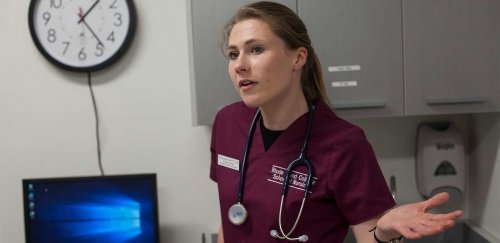SBIRT in Action – Opening Up Conversations on Substance Use
- News & Events
- News
- SBIRT in Action – Opening Up Conversations on Substance Use

Rhode Island College nursing student Meaghan Whittum discusses patient with her health-care team.
A middle-aged accountant walks into a primary care clinic. He says he has severe back pain and his prescription painkiller Percocet isn’t helping anymore.
A doctor, a physical therapist, a nurse, a social worker and a pharmacist work together to understand his symptoms and design a treatment plan. It’s a respectful, collaborative interaction, except they miss an important fact about this patient – he’s been injecting heroin between his toes to feel better. Now, he’s addicted.
That means the pain management plan they designed is unlikely to work. More importantly, they’ve missed an opportunity to refer him to drug treatment – a pathway to recovery.
Chris Dorval, the project coordinator of the Rhode Island SBIRT Training and Resource Center at Rhode Island College, which is funded by the Executive Office of Health and Human Services, says medical professionals often fail to ask their patients about substance use, especially if their patient seems “normal.” “The reality is that [an addict] could be anyone,” says Dorval.
Luckily, the patient in this scenario is an actor and the health-care professionals treating him are actually students from three higher education institutions in Rhode Island, including Rhode Island College nursing student Meaghan Whittum and social work student Tiffany Word.
Held at an interprofessional education event in Providence, this simulation was designed not only to give students practice working together in health-care teams but to test their ability to screen patients for substance use. Watching and evaluating their approach was Dorval, who trains medical professionals to have conversations with their patients about drug and alcohol use.
Dorval tells the students that it’s their job to normalize questions about substance use, so patients feel safe enough to tell the truth, “because if you’re comfortable asking these questions, they’ll be comfortable. If you’re uncomfortable, they’re going to read it all over you and be like, ‘Oh, there’s something to be worried about here.’”
The training program Dorval uses to help medical professionals have these conversations is called SBIRT, which stands for Screening, Brief Intervention, and Referral to Treatment. The Rhode Island SBIRT Training and Resource Center teaches health-care providers to ask every patient about substance use, discuss the patient’s level of motivation to get help and connect them to treatment resources.
Sarita Warrier, an assistant dean of medical education at Brown University’s Warren Alpert Medical school, says, “The large picture is that substance use is an unfortunately devastating part of the health-care world that we see.” For instance, Warrier says, “We know in Rhode Island that opioid overdose deaths are a leading cause of accidental deaths for our community.”
That’s why this type of training is so important for Warrier’s students and health-care professionals in general.
Thanks to funding from the State of Rhode Island, over the past three years, SBIRT has taught nearly 1,000 health-care professionals how to have these conversations about substance use. And it appears that these trainings are already making a difference. The organizations who have gone through SBIRT report a significant increase in screenings, referrals and treatments for substance use.
But the work isn’t done yet. Chris Dorval wants to reach more health-care workers, especially those like Word and Whittum, who are still in training. He says, “We just need to continue to make this something that is part of academic curricula across the health-care spectrum, whether it's nursing, social work, pharmacy, physical therapy and obviously medical students.” The hope is these conversations become so routine that they become an intuitive part of their health-care practice even before they graduate.
State funding for the SBIRT Training and Resource Center runs out at the end of June, but Rhode Island College has already received additional grants to keep the program running for another year and, hopefully, many more.
